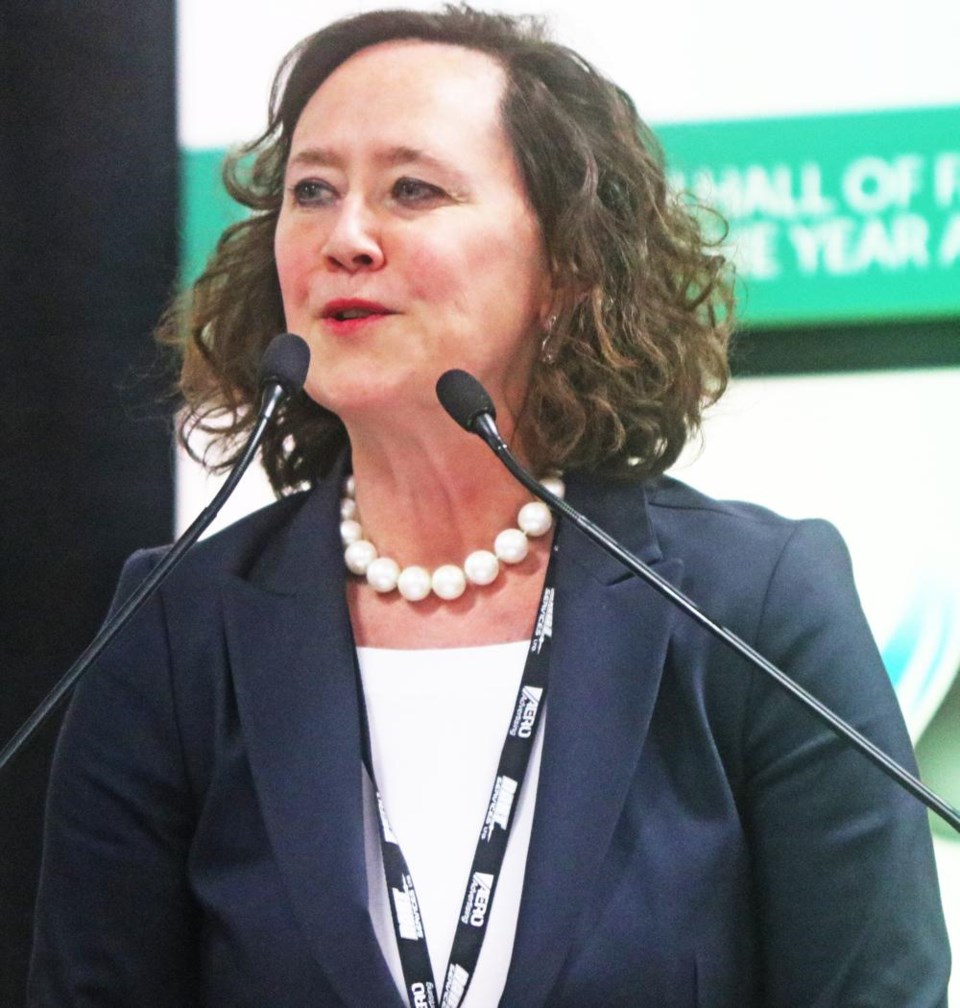WEYBURN – Saskatchewan can no longer allow itself to be treated with contempt by the federal government, declared Bronwyn Eyre, new Justice Minister and former Energy minister, in her last speech to the Saskatchewan Oil and Gas Show on Wednesday evening.
She had been in the Energy and Resources portfolio up until the day before the Oil Show, when Premier Scott Moe made some changes in the cabinet, moving her to Justice, and appointing Ken Reiter as the new Energy and Resources minister.
In her speech, just before she helped present the two Oilmen of the Year awards, Eyre had highly critical words for the province’s treatment by the federal government.
She said it’s meant a lot to her to serve in the Energy portfolio, she told the roomful of oilfield producers and executives, pointing out they “make this province great.”
Eyre will be dealing with the federal government a lot in her new role at Justice, as the province challenges the government on constitutional matters.
“We cannot continue to be treated in the West and in Saskatchewan with contempt,” she said, to loud applause and a cry of “hear, hear!”
“Whether it’s augmented federalism or a nation-within-a-nation, or whatever you want to call it, the constitutional treatment of Saskatchewan can no longer be based on economic punishment. When it come to the energy conversation, the whole world is tearing up the script and we’re adjusting to what the Bank of America is calling the new energy world order,” said Eyre, noting that energy has been the best-performing sector of the past year.
“Our stability has been in spite of, and not because of, the federal government, as provinces like Saskatchewan has fought the energy fight,” she said, noting she began in the Energy portfolio four years ago right after Energy East had been nixed, followed by the losses of the Keystone XL and Northern Gateway pipeline projects.
A positive action was the recent ruling of the Alberta Court of Appeals that Bill C-69, dubbed the “pipeline killer” bill, was unconstitutional. Eyre pointed out that in 2018 when the ministers from across Canada met in Nunavut, and this bill was presented as coming soon by the federal government, she urged her fellow ministers to walk out and not sign the end-of-conference statement, because this bill “was a pipeline killer, a project killer, an energy killer, and a massive violation of provincial jurisdiction – so we walked out. We raised concerns about the deeply destructive impact of that bill.”
If the federal goal is reducing emissions, Eyre pointed out that the oil and gas sector’s emissions have been flat for the past 20 years, and if every country that extracts oil and gas did so with the same standards as Canada has, global emissions would have fallen by 25 per cent by now.
“The federal government wants to cap production on what is already flat,” said Eyre. “Western Canadian oil is already best in class.”
To compound this situation, the federal carbon tax has been pounding residents and businesses in this province, and the federal government has openly said they cannot measure how much carbon has been reduced.
Providing statistics that are available in Saskatchewan, Eyre noted that this province only contributes 0.15 per cent of global emissions, plus Saskatchewan’s emissions have fallen by 20 per cent from 2008 to 2020, while the province’s GDP has gone by 12 per cent.
“We don’t need economic punishment when we have those numbers,” said Eyre, noting a key reason for the reduced emissions is the province has ensured a reduction in methane emissions in particular.
“The world is watching Saskatchewan and our explicit goal to increase production to 600,000 barrels a day by 2030,” said Eyre, adding the province is also developing other critical minerals like lithium, helium, uranium, potash and nickel.
She noted for example that Saskatchewan can provide 10 per cent of the world’s needs for helium by 2030.
“We have got to get our story out, and keep telling the story of carbon capture and storage,” she said, because if the federal policies keep rolling the way they are now, up to half a million energy workers could be out of a job across Canada.
In addition, many companies and farmers could be hurt or shut down simply due to the government’s emissions policy, said Eyre. “We can’t let that happen. We can’t let that happen to First Nations … Everyone complains about emissions, but we never hear any real solutions. We need an energy policy that doesn’t ruin our economy.”
Eyre read the bios for the Saskatchewan Oilman of the Year, Grant Fagerheim of Whitecap Resources, and the Southeast Sask. Oilman of the Year, Derrick Big Eagle, and helped show chair Dan Cugnet to present the awards to each of them.





